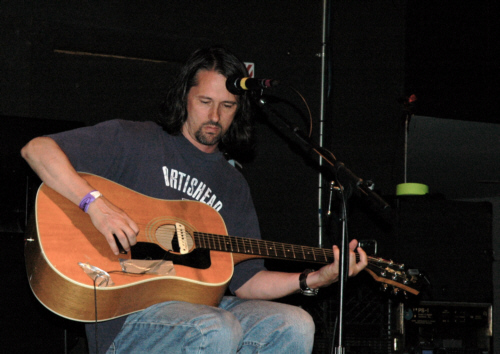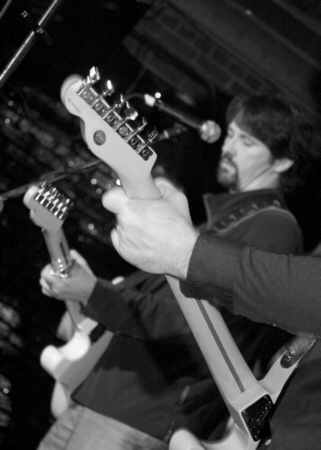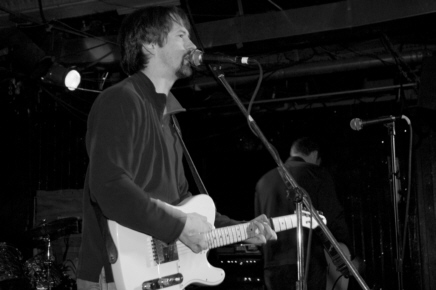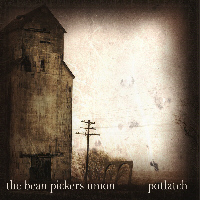
Chuck Melchin
(The Bean Pickers Union)
talks about
"Potlatch"
by Johanna J. Bodde

|
CHUCK MELCHIN (The Bean Pickers Union) talks about "Potlatch" (Inseam Records) This record was recorded over a period of about a
year, and in 4 different studios, and with a revolving cast of players. Having
no set lineup was both a blessing and a curse. On the one hand I got to work
with some of my favorite musicians from Boston and around New England. On the
other hand, I really had no one to tell me whether or not something was a really
bad idea. Fortunately, the musicians I worked with were really talented, and had
such great ears. And I was especially lucky to have found Eric Lichter who
co-produced 6 of the tracks, and played about a gazzilion instruments
throughout.
PHOTOGRAPH This song tells the story of a flood and the
resulting devastation in the Midwest of the United States. It is actually a
commingling of many stories that I’ve been told of different storms at different
times, and what the farmers had to deal with in the aftermath.
This was the first song Eric and I did at Dirt
Floor Studio. I had written it just a couple of days before and had no idea how
I wanted to play it – full band, solo acoustic, marching band? I was clueless.
So we recorded me playing it straight on the acoustic, then Eric had this idea
to play a haunting octave piano theme, and off we went. The distorted guitar
lead I played was recorded when I thought we were just setting levels. I got
thru the song and said to Eric, “ok. I think I know what I’m going to do”, and
he said, “dude, you just did it”. He was right, I wouldn’t change a thing. The
high point of this song for me is when Sandra Lauren Lichter comes in with the
plaintive wail of a harmony in the middle part. Her voice sounds like
grief.
WARRIOR This song is set in the American civil war, but
could have been set in any war, in any place, at any time. It’s really about the
sacrifice we ask people to make when we send them off to war. On the recording
side, I had bass, drums and my rhythm guitar recorded and was heading in one day
to Moontower Studio to do the vocals when I thought of how great it would be to
have my favorite guitarist John Brookhouse play the lead on this song. So I
called and asked him if he’d like to give it a go, and although he had a show
with another band in less than 2 hours, he stopped in the studio and in one take
nailed the record’s most perfect lead. Amazing.
REAPER
Reaper is maybe my favorite song on this record. We
played with all kinds of ways to arrange it and in the end felt leaving it
really sparse was the best way to go. Eric played the slide guitar using an old
amplifier tube as a slide. The scratchy record sound intro was recorded off of a
Shawn Cassidy record. True story.
BRIDE
The old British rock band Cream had a song called
“Badge”. The story goes that Badge got its name when George Harrison was
visiting Eric Clapton and Eric wanted to show George this new song he had
written. Eric had the words written down on a piece of paper with the chords to
the song written across the top. The chords were B, A, D, G and E. George asked,
“what’s this one called, Badge?”. And so it went. Well, I had just written Bride
and was showing it to my brother. Next to the words I had written which parts
were which – verse, chorus, and for the middle part I written bridge, but I
spelled the word wrong. Luckily, Bride turned out to be an appropriate name for
this song.
INDEPENDENCE DAY Back when I was maybe 19 or so, I was living in
Memphis, and traveled with one of my friends for a weekend to his hometown,
somewhere up in rural central Indiana. The town was a single road off of a state
highway, with a big loop that kids our age would drive around and around on
Friday and Saturday nights, showing off their cars, smoking red bud weed,
flirting with girls. Independence Day is set in this town. It’s about a young
guy that was always searching some meaning in his life, and has meaning thrust
upon him when a girl he is dating gets pregnant. But when she tells him, at the
town’s 4th of July parade, that she’s already had an abortion,
instead of being relieved, he is devastated. I love the snarl and bite of the
electric guitar in this song, and the Wurlitzer organ storm at the very
beginning. |
 HOME
Home is an older song that we had been doing for a
couple of years as a full on country rocker. This recording is the way the song
was originally written, and I like it a lot better this way.
I'M SO SORRY It was a bit of a crapshoot recording I’m So Sorry.
I had just had surgery on the pinky of my left hand, making it really difficult
to form my hand into the shape of certain guitar chords, one of which is
prominently featured in this song. With the help of my friend Vitamin
I (ibuprofen) I was able to get through it. And I am so glad, cause Bob
Metzger’s guitar work lifts this song into rarified air, and I feel lucky to
have been along for the ride.
WALTZ NO. 1 Waltz No. 1 was recorded at home, the result of a
combination of intoxicants unlikely to be recreated any time soon. It had never
been played before and will probably never be played again, so I just had to
include it on the record.
PROMISE I had recorded Promise once or twice before, but it
never quite had the right feel. Then I was at Hi N Dry Studio to do some
additional mixing on a couple of tracks, and had some extra time to fill, so I
thought I’d give it another shot. Mandolin madman Sean Staples was around and
his playing really put this song over the top for me. Sean is a certified bad
ass.
JENNY ANNE
I wrote Jenny Anne after spending a long weekend
hanging out in the SoHo district of Manhattan. I had a chance to do a lot of
people watching (one of my favorite sports) and realized just how lonely a
person can be in a city filled with millions of people. Roger Lavallee’s
haunting lead guitar and Ed Murray’s melodic bass lines are my favorite elements
of this song. And it makes a nice powerful ending to the record.
===  |
